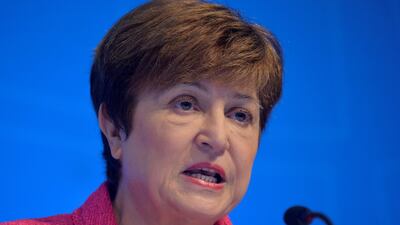Support from the 20 most industrialised nations for a $50 billion International Monetary Fund vaccine plan could lead to trillions of dollars of gains from an accelerated economic recovery, the IMF's managing director Kristalina Georgieva says.
Such a move would be "the best public investment of our lives and a global game-changer".
Ms Georgieva called for immediate action by the G20 to stem the rising human and economic cost of Covid-19, saying diverging access to vaccines causes worsening disparities in economic performance.
“The world is facing a worsening two-track recovery, driven by dramatic differences in vaccine availability, infection rates and the ability to provide policy support,” Ms Georgieva said ahead of the two-day G20 finance ministers and central bank governors’ meeting in Venice, Italy, this week.
“It is a critical moment that calls for urgent action by the G20 and policymakers across the globe.”
Faster access to vaccinations for high-risk populations could “potentially save more than half a million lives in the next six months alone”, according to the fund's estimates.
IMF managing director
Funding worth $50bn is needed to help overcome the pandemic, with about 70 per cent in the form of grant financing from major global economies, the IMF estimates.
Its plan lays out defined actions at a feasible cost and is endorsed by the World Health Organisation, the World Trade Organisation and the World Bank.
Multilateral action is required to vaccinate at least 40 per cent of the population in every country by the end of 2021 and at least 60 per cent by the first half of 2022, the IMF said.
“Support from the G20 and other economies will make all the difference by endorsing the vaccination target”, Ms Georgieva said.
The global economy is recovering broadly in line with the fund’s April projections of 6 per cent growth in 2021 after plunging into its worst recession since the 1930s.
More than $16 trillion of fiscal and $9 trillion of monetary support by governments and central banks across the world has helped the recovery, but the latest data confirms a deepening divergence in economic fortunes, with a large number of countries falling further behind, the IMF said.
“After a crisis like no other, we are seeing in some countries a recovery like no other, propelled by a combination of strong fiscal and monetary policy support and rapid vaccinations,” Ms Georgieva said.
A global economic recovery still remains uncertain as Covid-19 infections and the emergence of new strains increase.
Poorer countries with low vaccination rates are more exposed to these. While the Delta variant is raising concerns everywhere, including among G20 members, it is rampant in nations across Sub-Saharan Africa.
“In that region, less than 1 adult in 100 is fully vaccinated, compared to an average of over 30 per cent in more advanced economies,” she said. “Unvaccinated populations anywhere raise the risk of even deadlier variants emerging, undermining progress everywhere and inflicting further harm on the global economy.”
Beyond vaccines, ensuring sufficient financial liquidity for weaker economies is essential for their survival. Supporting these economies to avoid a “further dangerous divergence” will require significant support, including grants from bilateral donors, creditors and international financial institutions, as well as debt relief and loan rescheduling.
However, the possibility of higher interest rates in the US on the back of rising inflation could lead to a sharp tightening of global financial conditions and significant capital outflows from emerging and developing economies, Ms Georgieva said.
“It would pose major challenges, especially to countries with large external financing needs or elevated debt levels.”
The G20's Debt Service Suspension Initiative and its extension have provided “welcome relief for more than 40 countries”. The proposed allocation of $650bn of new Special Drawing Rights can also help meet the global need to supplement reserves and will support recovery efforts, the IMF said.
“This week’s G20 meeting is an opportunity to advance the plan for a new Resilience and Sustainability Trust, which would support low-income nations as well as poorer and vulnerable middle-income countries ravaged by the pandemic. It would help them with structural transformation, including confronting climate-related challenges,” Ms Georgieva said.
“We are also exploring a new ‘vaccine window’ under our emergency financing facilities, which would support countries in financing vaccination programmes if needed.”


